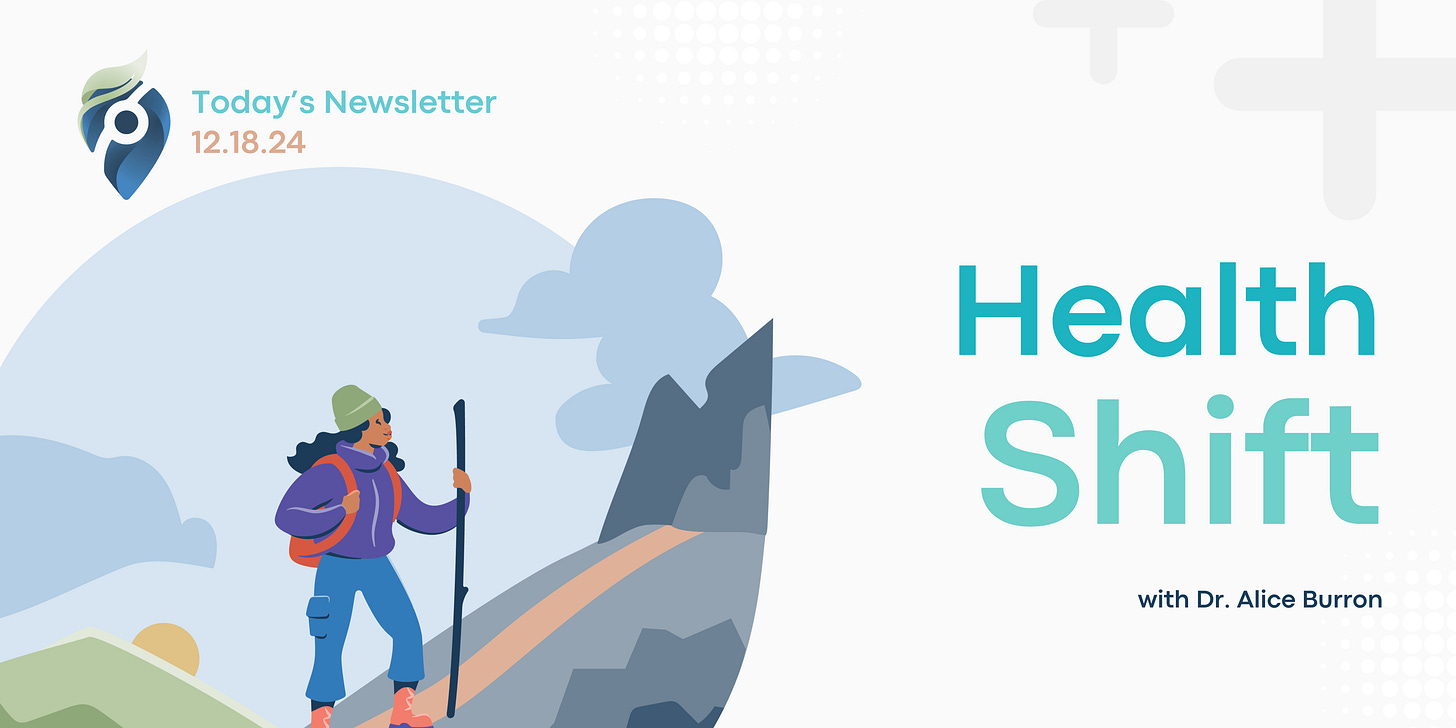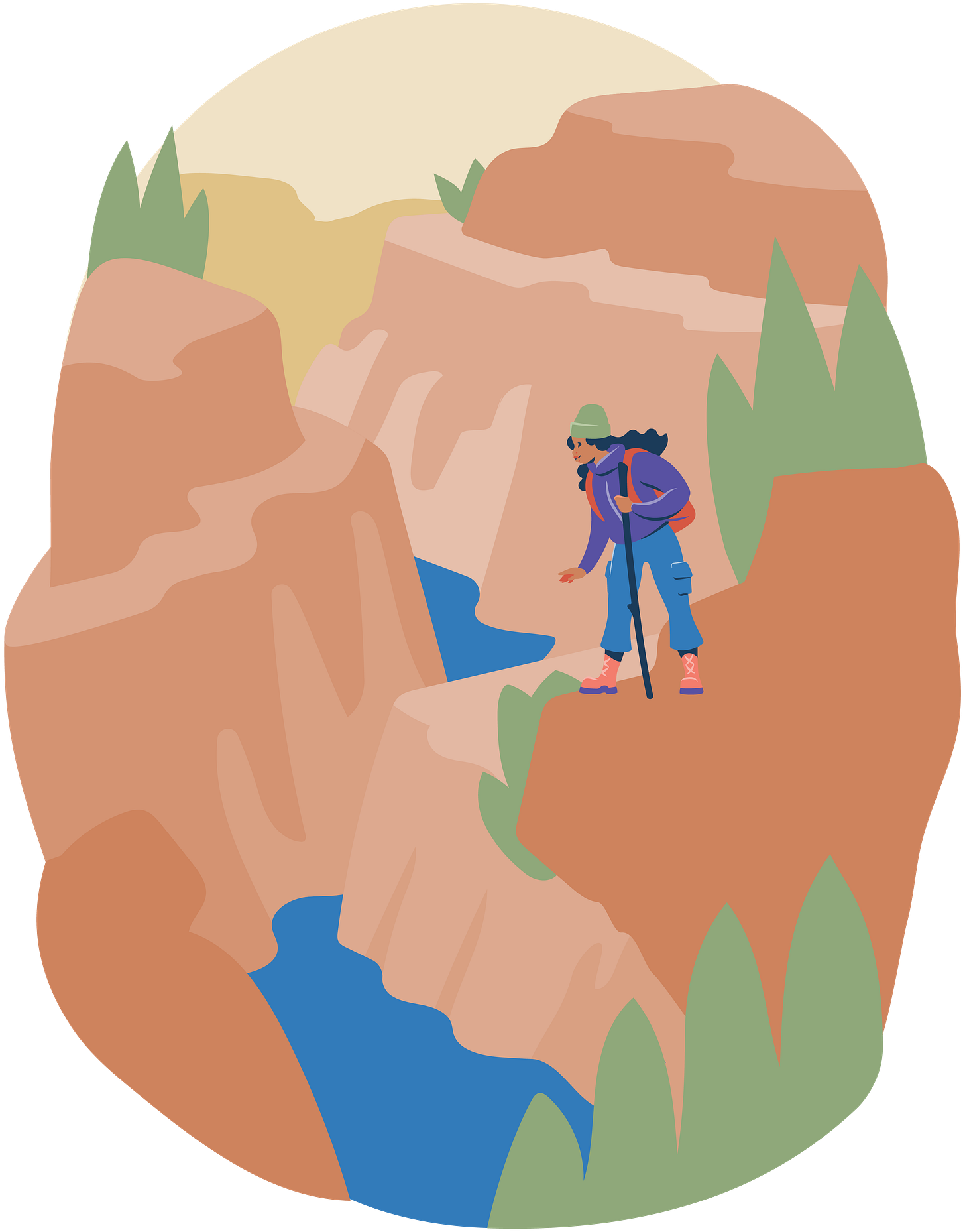A Gift You Give Yourself: A Way to Outsmart the Current Health Landscape
As our health and healthcare system become more confusing and unstable, you need a way to navigate your health that makes sense for YOU.
On Tuesday, I shared with you the futuristic, sci-fi notion that a pill for exercise is coming down the pharmaceutical pipeline. This is only a tiny part of what’s to come in 2025 and beyond. As the pharmaceutical industry becomes more innovative, we need to become more innovative in how we approach our health. We have no time to lose.
Beyond taking medication or navigating strange health symptoms, it begs you to ask the question: how do I know if any health intervention is worth my time, effort, and money? How do I know it’s going to work? And how do I know if something is right for me?
That’s where the healing begins. It begins with pre-deciding what to do—being prepared before your health gets out of balance or a health intervention tempts you. The approach below will empower you to ask questions, know what you want, and be prepared. Are you ready to face your health and health decisions like a Health Hero? If so, let’s get started. (Length warning: Feel free to skim through now, read and meditate on it later, and refer to it constantly.)
You Need a Health Philosophy You Can Lean On to Filter All Health Decisions Through
Without a health philosophy, navigating your health can feel like being tossed in a storm without a compass. You’ll find yourself trying anything and everything, often with little success or satisfaction. A health philosophy is your personalized guide—a clear framework that reflects your values, preferences, and beliefs about how you want to approach your health.
For some, this means leaning on medical interventions at every turn, while others prefer to start with lifestyle changes or complementary approaches. Most of us fall somewhere in between. It’s not about choosing one path exclusively; it’s about defining your unique balance and being prepared when health challenges arise.
Think of your health philosophy as a filter that simplifies decision-making. It allows you to assess options—whether they’re lifestyle adjustments, complementary therapies, or medical treatments—and align them with the outcomes you desire and the role you see yourself playing in your health journey.
For example, imagine dealing with chronic joint pain. Without a health philosophy, you might rush into trying every suggestion—anti-inflammatory diets, acupuncture, physical therapy, or injections—without knowing which approach truly resonates with you. But with a health philosophy, you can quickly determine your priorities: Is it important to exhaust non-invasive options first? Are you comfortable with medical interventions right away?
By creating your health philosophy, you take charge of your health decisions. You’ll have a consistent framework to guide you, reduce overwhelm, and stay aligned with what matters most to you—whether it’s a holistic, medical, or blended approach to healing.
We all have natural tendencies in how we view and manage our health. Defining these tendencies and formalizing them into a clear stance helps us create what I call an intentional bias. This mental shortcut allows you to quickly dismiss options that don’t align with your values or priorities, saving time and reducing decision fatigue.
When faced with a new health option, consider these questions:
Does this align with my general health philosophy?
Could fear be causing me to move outside of my general health philosophy?
How does this intervention fit into my core approach to health? Does it feel right?
Is this something I genuinely need, or is it just another trend? Do I see myself using this intervention long-term, and if so, what would that look like?
Is this addition really necessary for my overall health?
Here are some sample approaches to use as a starting point. Mix and match, make your own parameters. But remember that you need to find one that resonates with you at your very core so that you can ground yourself there whenever you are faced with a health decision. When you don’t know your health philosophy, you risk feeling overwhelmed and reactive, jumping from one option to the next without a clear sense of direction. This can lead to frustration, wasted time, and choices that don’t align with your values or long-term health goals. Do any of these resonate with you? If only parts, which part?
Direct and Action-Oriented
"When a health issue arises, I take action immediately. I believe in addressing problems head-on with effective, proven interventions. I trust medical advancements and prioritize treatments that can deliver quick and reliable results. Prevention is important, but when something goes wrong, I want solutions now."
Cautious and Wait-and-See
"I prefer to observe and evaluate before making any major decisions about my health. I give my body time to respond to changes naturally and avoid rushing into treatments. I value simplicity and am skeptical of unnecessary interventions, trusting that with time and gentle care, most issues will resolve on their own."
Doctor-Centered and Science-Focused
"I trust my healthcare providers to guide me in making the best decisions. I rely on their expertise and recommendations, and I’m open to following their advice on medications, procedures, or therapies. My health philosophy is rooted in evidence-based medicine, and I’m comfortable with a clinical approach to my well-being."
Holistic and Natural-First
"I believe in nurturing my health through natural and complementary methods before considering medical interventions. I prioritize lifestyle changes, nutrition, movement, and emotional balance to support healing. When needed, I will explore medical options, but only after exhausting holistic approaches first."
Balanced and Blended
"I believe in a balanced approach to health that incorporates the best of both worlds. I start with lifestyle and complementary interventions but won’t hesitate to pursue medical treatments when necessary. My goal is to align my health choices with my values, using the right tool at the right time for my unique needs."
Empowered and Preventative
"I see myself as the primary manager of my health. I prioritize prevention and focus on maintaining my Core 4—hydration, nutrition, exercise, and sleep—to avoid major health issues. When challenges arise, I thoroughly research and weigh my options to make informed, proactive decisions."
Community-Driven and Supported
"My health journey is a shared experience. I lean on my family, friends, and healthcare team to help me navigate challenges. I value open communication and collaborative decision-making, ensuring that my choices reflect the input of those who support me."
Curious and Open-Minded
"I approach my health with curiosity, exploring different perspectives and options before making decisions. I’m open to trying new treatments, whether they’re cutting-edge medical innovations or ancient holistic practices. I trust my ability to experiment and find what works best for me."
Minimalist and Non-Invasive
"I believe in doing as little as possible to maintain my health. I avoid unnecessary medications, surgeries, or interventions unless they’re absolutely essential. My focus is on maintaining a strong foundation through simple, consistent habits that keep me well."
Adaptable and Evolving
"My health philosophy is flexible and adapts as I learn more about my body and the options available to me. I’m open to changing my approach based on new information, life circumstances, or personal growth. What works today might not work tomorrow, and I’m okay with that."
None of these philosophies are wrong, nor inherently good or bad. They are your preferences in how you approach your health. Establishing a health philosophy and sticking to it is a filter for all your health decisions. It empowers you to make thoughtful, intentional choices based on what truly matters to you, not fleeting trends or external pressures. With an intentional health bias, you stay grounded, confident, and aligned with your personal health goals.
You can read more here about establishing a health philosophy:
You Need the Core 4, No Matter What Health Decision You Make
The Core 4—hydration, exercise, nutrition, and sleep—is the unshakable foundation of health. Without these four elements, your health will collapse, much like a skyscraper without its base. They are non-negotiables: if you neglect them, the consequences are inevitable.
Before starting any new medication, take a moment to reflect:
How well am I managing the Core 4?
Could gaps in the Core 4 be contributing to the health issue I’m trying to solve?
How will this new medication interact with these foundational pillars?
These questions might seem simple, but they’re often overlooked. Many of us aren’t setting up our bodies for success, making it harder for medications or any interventions to do their job effectively. In fact, improving the Core 4 can amplify the benefits of medications, and in some cases, it might even eliminate the need for them altogether.
You can’t fully understand how a medication will interact with your body without first addressing the fundamentals that keep it running smoothly. The Core 4 ensures your body is equipped to heal and respond optimally.
Yes, these are the “unsexy” truths about health. Healing rarely comes with quick fixes or magical shortcuts—and that’s okay. The real power lies in these simple, steady practices that create the foundation for long-term success.
You can read more here.
You Need to Consider The Six Questions That Everyone Should Answer Before Making Any Health Decision, Especially for Bigger Health Decisions
At Health Shift, we reference the CREECS method often—and for good reason. It’s a game-changing framework that can transform how you approach health and healing decisions. This six-step approach helps you make thoughtful, informed choices by considering:
Cost
Can I afford this, especially over the long term? Is the investment worthwhile? Is it covered by insurance, or will it be an out-of-pocket expense? Are there less costly alternatives I could try first?Risk
What is my risk tolerance for this intervention? What are the potential side effects or long-term consequences? Do the risks outweigh the benefits? Could it lead to unforeseen issues, such as metabolic disruptions with weight loss medications? Will it impact other healthy habits I’ve worked to build?Effort
Does this require ongoing maintenance or significant lifestyle changes? Am I willing to commit to this effort long-term to achieve results? Could relying on this intervention make me complacent about other healthful behaviors?Effectiveness
How effective is this compared to alternatives? Does it address broader needs, such as mental health or physical balance, that the intervention alone cannot solve? For example, does it replicate the full benefits of exercise or just certain aspects of it?Commitment
Am I ready to adhere to the prescribed regimen? Will I need regular monitoring or adjustments? What challenges could derail my commitment, and how will I handle them?Support
Do I have access to the necessary medical, emotional, or community support? If this is a lifelong intervention, do I have a healthcare provider to guide me through the journey? How will this decision affect not only me but also those closest to me?
Combined with a health philosophy, considering the CREECS six questions, you’ve set the stage for a good health decision. If they align, you’ll be fine, I say. Once you’ve established your health philosophy and strengthened the fundamentals of the Core 4, the CREECS framework becomes a powerful tool. It helps you evaluate any health intervention through the lens of your values and priorities, ensuring that your decisions are thoughtful, balanced, and aligned with your long-term goals.
Science Meets Wisdom: The Health Hero Approach
It’s easy to feel overwhelmed by the sheer volume of new options. Medications like GLP-1s, originally designed for diabetes, are now being widely used for weight loss, often for reasons unrelated to medical necessity. The same could happen with exercise mimetics or future breakthroughs, leading to overuse, misuse, or reliance on medications for convenience rather than true need.
But panic isn’t the answer. Nor is thinking you won’t fall for such a thing as this. What is the answer? Health decision ownership is. You can become the Health Hero of your story by embracing curiosity, self-awareness, and a structured decision-making process. This means:
Staying informed about emerging therapies.
Understanding your own health needs and preferences through a clear philosophy.
Using tools like CREECS to make logical, informed decisions.
Taking proactive steps to optimize foundational health practices, such as exercise, nutrition, sleep, and hydration.
Make a Plan Now How You’re Going to Decide
Medical innovation is exciting, and for many, it will offer life-changing benefits. But it’s important to remember that science doesn’t exist in a vacuum—it intersects with our behaviors, values, and choices.
By preparing now, you can face the future of therapeutic medicines with confidence and clarity, knowing that every decision you make is aligned with your unique health journey.
Let’s start the conversation about what’s coming and how we can navigate it—together, with wisdom and a proactive spirit.
“The best way to predict the future is to create it.”
—Peter Drucker
Before I sign off, I still need your input on my book cover!
You can also message me with your thoughts or leave a comment. Please help me make a decision (by tomorrow morning)! After tomorrow, it will be too late, and I would have chosen. Your vote counts!
Have a great weekend,
Dr. Alice
A little more about Dr. Alice Burron and The Health Navigator Group:
You can find more about The Health Navigator Group at our website: www.thehealthnavigator.org
On Instagram: @the.health.navigator
And learn more about Dr. Alice Burron at her website: draliceburron.com
Or via her personal Instagram: @dr_burron
You can even connect with her on LinkedIn, if you want to be professional about it. 👓
And if you’re not subscribed to our Substack, what are ya doing? It’s free, and packed full of useful tools to help you on your journey to better, faster healing.















